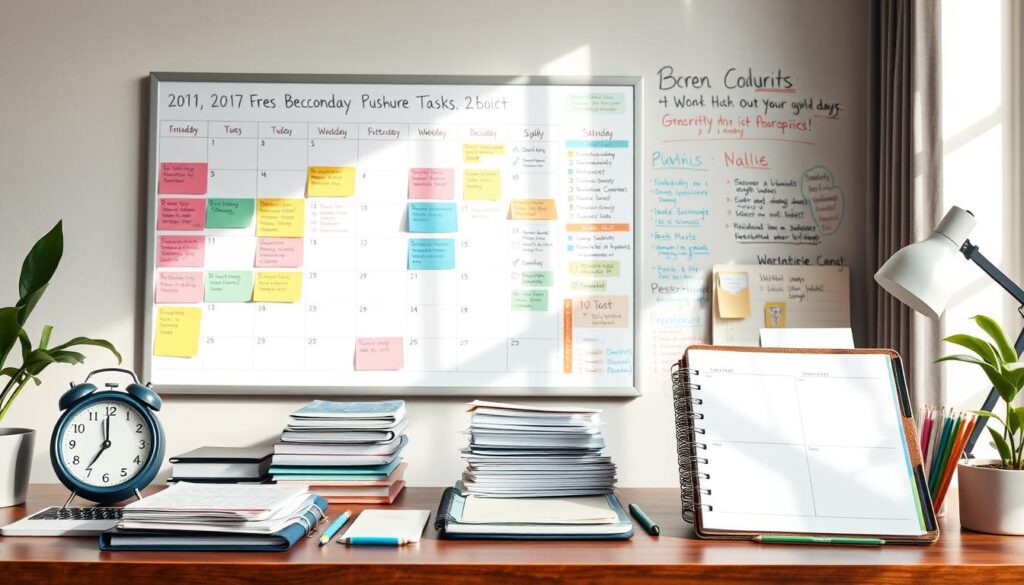As I sit here, staring at the blinking cursor on my screen, I feel a familiar tug of procrastination. This battle is one I’ve fought countless times. Yet, it’s a fight I must win to achieve my goals and live a fulfilling life. Procrastination, that sneaky adversary, robs us of our time, dreams, and sense of accomplishment. It creeps into our lives, no matter how disciplined we think we are.
Today, I’m determined to break free from its grip. I know I’m not alone in this struggle. That’s why I’m excited to share 10 effective strategies that have helped me and countless others overcome procrastination. These strategies will empower you to take control of your life and start achieving the success you deserve. Whether you’re a student juggling deadlines, a professional facing endless to-do lists, or simply someone who wants to make the most of their time, these strategies will help you.
Key Takeaways
- Understand the root causes of procrastination, such as fear of failure, lack of motivation, and perfectionism.
- Break down large tasks into smaller, more manageable steps to make them less overwhelming.
- Eliminate distractions and create a focused, distraction-free work environment.
- Practice self-compassion and avoid self-criticism, which can exacerbate procrastination.
- Utilize time management techniques like the Pomodoro method to boost productivity.
Understanding the Reasons Behind Procrastination
To conquer procrastination, it’s crucial to grasp the underlying causes. Identifying specific triggers helps in crafting effective strategies. Common culprits include fear of failure, lack of motivation, perfectionism, and feeling overwhelmed.
Fear of Failure
The fear of failure is a major procrastination trigger. People often delay starting tasks due to the fear of not succeeding. This fear can arise from a fear of criticism or a need to safeguard their self-esteem.
Lack of Motivation
Lack of intrinsic motivation is another significant factor. Tasks seen as uninteresting, too challenging, or not aligned with personal goals can be hard to initiate.
Perfectionism
Perfectionistic tendencies can also contribute to procrastination. Those who aim for flawless results may hesitate to begin tasks, fearing they won’t meet their high standards.
Overwhelming Tasks
Feeling overwhelmed by tasks or projects is another common reason. When tasks seem too large or complex, people may avoid them, unsure of where to start.
Understanding the reasons behind procrastination allows individuals to develop targeted strategies. This approach can help overcome procrastination and enhance productivity.
Break Big Tasks into Smaller Ones
Dealing with a large or complex task can be overwhelming, leading to procrastination. However, breaking down big tasks into smaller, more manageable steps can revolutionize your productivity and task management. This method reduces the task’s daunting nature. It also helps build momentum and keeps you motivated.
Here are some effective strategies for breaking down tasks and boosting your productivity:
- Identify the subtasks: Start by listing all the individual steps needed to finish the larger task. This gives you a clear roadmap.
- Set mini-deadlines: Assign realistic due dates for each subtask. This creates a sense of urgency and accountability.
- Prioritize and sequence: Arrange the subtasks by importance and dependencies. This ensures you tackle the most critical ones first.
- Celebrate small wins: Acknowledge and celebrate your progress as you complete each subtask. This fuels your motivation to keep going.
“The secret of getting ahead is getting started. The secret of getting started is breaking your complex overwhelming tasks into small manageable tasks, and then starting on the first one.” – Mark Twain
By breaking down tasks, you can turn overwhelming goals into achievable steps. This makes it easier to overcome procrastination and enhance your productivity strategies.
Eliminate Distractions
Distractions can hinder productivity and lead to procrastination. It’s essential to identify and remove distractions in your environment. This will help you create a space where you can focus without interruptions.
Identify Sources of Distraction
Recognizing what distracts you is the first step. Common distractions include social media, email, notifications, and the people and noises around you. Reflect on what typically diverts your attention from your tasks.
Practise Self-Awareness
Self-awareness is crucial in overcoming distractions. Notice when you get sidetracked and understand why. Is it because you’re overwhelmed or unsure about the task? Identifying these reasons can help you stay focused.
Create a Distraction-Free Environment
- Reduce digital distractions by silencing notifications, closing unnecessary tabs and apps, and using website blockers or browser extensions.
- Set up a specific workspace for focused work, free from clutter and distractions.
- Use noise-cancelling headphones or calming background music to enhance concentration.
By identifying distractions, practicing self-awareness, and creating a distraction-free space, you can improve your focus and overcome procrastination.
“The ability to discipline yourself to delay gratification in the short term in order to pursue a longer-term goal is the key to both personal and professional success.” – Brian Tracy
Practise Self-Compassion
In the quest to conquer procrastination, embracing self-compassion is a game-changer. Self-compassion means treating yourself with kindness, understanding, and patience, even when outcomes are less than ideal. This mindset helps break the cycle of self-criticism and fosters a growth mindset to face challenges head-on with resilience.
Often, we are our own worst critics, harshly judging ourselves for procrastination or unmet expectations. Yet, this self-criticism can hinder progress, leading to more avoidance. By adopting self-compassion, you can shift your approach to challenges, fostering a nurturing attitude that boosts your ability to overcome procrastination.
Building self-compassion involves several strategies:
- Speak to yourself with the same kindness and understanding you would offer a close friend or loved one facing similar challenges.
- Recognize that setbacks and failures are part of the learning journey, and you’re not alone in them.
- Replace negative self-talk with more empathetic and encouraging inner dialogue.
- Engage in self-care activities, like meditation, journaling, or taking a break, to nurture your well-being.
By embracing self-compassion, you foster a resilient and positive mindset. This is crucial in overcoming procrastination and reaching your goals. Remember, progress is not always linear. Self-compassion aids in navigating life’s ups and downs with greater ease and self-acceptance.
“The greatest weapon against stress is our ability to choose one thought over another.” – William James
Use the Pomodoro Technique
The Pomodoro Technique is a transformative approach to time management and productivity. It’s a simple yet powerful method designed to combat procrastination and enhance focus throughout the day.
This technique involves dividing your work into 25-minute segments, called “pomodoros,” with brief breaks in between. It promotes task prioritization, minimizes distractions, and encourages regular breaks. These elements are essential for maintaining productivity and focus.
- Set a timer for 25 minutes and focus on a single task without any interruptions.
- When the timer goes off, take a 5-minute break to refresh your mind.
- Continue this cycle for a predetermined number of pomodoros, followed by a 15-20 minute break.
The Pomodoro Technique’s simplicity and adaptability make it a valuable asset for anyone looking to improve their time management, productivity, and focus. It can be tailored to fit your unique work style and needs.
“The Pomodoro Technique has been a game-changer for my productivity. It helps me stay on track, minimize distractions, and maintain a healthy work-life balance.”
If you’re battling procrastination or feeling overwhelmed by your tasks, the Pomodoro Technique might be the answer. It could be the key to conquering your tasks and achieving your goals.
| Benefit | Description |
|---|---|
| Improved Focus | The Pomodoro Technique enhances focus by dividing work into manageable intervals. This reduces the urge to multitask or get sidetracked. |
| Reduced Procrastination | The structured approach of the Pomodoro method helps overcome procrastination. It enables you to complete tasks more efficiently. |
| Boosted Productivity | By incorporating regular breaks, the Pomodoro Technique maintains high productivity and energy levels throughout the day. |
Set Realistic Goals
Achieving your goals is key for personal and professional growth. However, setting unrealistic targets can lead to procrastination. It’s vital to set realistic goals that match your abilities and resources.
Break Big Goals into Mini Goals
Large goals can be overwhelming, causing procrastination. Instead, divide your main goals into smaller, more manageable mini-goals. This approach keeps you focused and motivated, as you can see your progress more easily.
Create a Roadmap
Creating a detailed roadmap for your goals is effective. Outline the steps, resources needed, and timeline. This clear path helps you stay on track and avoid distractions.
Be Realistic About Capabilities
When setting goals, it’s crucial to be realistic about your capabilities. Evaluate your skills, time, and resources to ensure goals are attainable. Overestimating your abilities can cause frustration and procrastination. Be honest about what you can realistically achieve.
| Goal Type | Examples | Characteristics |
|---|---|---|
| Realistic Goals | – Completing a project by the end of the month – Saving a specific amount of money each week – Exercising for 30 minutes a day |
– Align with your capabilities and resources – Have a clear timeline and action steps – Provide a sense of progress and accomplishment |
| Unrealistic Goals | – Finishing a year-long project in a month – Saving thousands of dollars a month on a tight budget – Exercising for 2 hours a day without any prior fitness routine |
– Exceed your current abilities and resources – Lack a realistic timeline and actionable steps – Can lead to feelings of frustration and procrastination |

By setting realistic goals, breaking them down, creating a roadmap, and being honest about your capabilities, you can overcome procrastination. This approach leads to the success you desire.
Create an Achievable Schedule
Creating an effective schedule is vital in overcoming procrastination. Begin by identifying your most urgent tasks and deadlines. This step ensures you focus on the most critical responsibilities first.
Then, allocate time wisely for each task, considering its priority and estimated duration. Be realistic about task times to avoid overbooking. Include flexibility in your plan for unexpected events or delays.
Prioritize Important Tasks
It’s common to get sidetracked by less important tasks. However, focusing on your most critical responsibilities is essential for productivity. Identify tasks with the greatest impact and allocate sufficient time to them.
Be Flexible with Your Schedule
Even the best plans can face unexpected challenges. Maintain a sense of flexibility in your schedule. Being adaptable helps you stay on track and prevents frustration from rigid plans.
By setting up a schedule that prioritizes key tasks and allows for flexibility, you can make significant strides against procrastination. This approach helps you reach your goals more effectively.
“The key is not to prioritize what’s on your schedule, but to schedule your priorities.” – Stephen Covey
10 Effective Strategies for Overcoming Procrastination
Procrastination is a common obstacle that can block our productivity and stop us from reaching our goals. Yet, by using effective strategies, we can conquer this challenge and reach our full potential. This section will delve into 10 proven methods to help you break free from procrastination and enhance your time management skills.
- Break Down Big Tasks into Smaller, Manageable Steps
- Eliminate Distractions and Create a Focused Environment
- Practice Self-Compassion and Mindfulness
- Utilize the Pomodoro Technique for Increased Efficiency
- Set Realistic Goals and Create a Roadmap to Achieve Them
- Develop an Achievable Schedule and Allocate Time Wisely
- Prioritize Important Tasks and Avoid Getting Stuck on Easy Ones
- Find an Accountability Partner to Keep You on Track
- Reward Yourself for Accomplishments, Big and Small
- Identify and Manage Procrastination Triggers
By integrating these 10 effective strategies into your daily life, you can conquer procrastination, increase your productivity, and reach your goals more easily. Remember, consistency and a positive mindset are crucial to unlocking your full potential and living a more fulfilling life.
| Strategy | Description |
|---|---|
| Break Down Big Tasks | Divide large, overwhelming tasks into smaller, more manageable steps to make them feel less daunting. |
| Eliminate Distractions | Identify and eliminate sources of distraction to create a focused, productive work environment. |
| Practice Self-Compassion | Be kind to yourself and avoid self-criticism, which can hinder your progress. |
| Use the Pomodoro Technique | Alternate periods of focused work with short breaks to maintain productivity and prevent burnout. |
| Set Realistic Goals | Establish achievable goals and create a roadmap to guide your progress. |
By implementing these strategies, you can overcome procrastination, boost your productivity, and achieve your goals with greater ease.
Prioritize Important Tasks
In today’s fast-paced world, it’s easy to feel overwhelmed by the sheer number of tasks on our to-do lists. However, the key to overcoming procrastination lies in prioritizing the most important and time-sensitive tasks. By identifying critical tasks and avoiding easy tasks that provide a false sense of progress, we can ensure that our efforts are focused on prioritizing tasks that truly matter.
Identify Critical Tasks
Start by taking a close look at your task list and separating the essential, high-impact tasks from the less important ones. These critical tasks are the ones that are directly linked to your goals and will have the greatest impact on your overall productivity and success. Devote your time and energy to these tasks first, ensuring they are completed with the care and attention they deserve.
Don’t Get Stuck on Easy Tasks
It’s tempting to tackle the quick and easy tasks first, as they provide a sense of accomplishment and progress. However, this approach can lead to a false sense of productivity and prevent you from addressing the more challenging, yet crucial, tasks. Resist the urge to get caught up in easy tasks and instead, focus your efforts on the critical tasks that will move you closer to your goals.
| Task Prioritization Strategies | Benefits |
|---|---|
| Identifying critical tasks | Ensures that your time and energy are focused on the most important and impactful activities. |
| Avoiding easy tasks | Prevents you from getting stuck in a cycle of easy, low-impact tasks and helps you make significant progress on your goals. |
| Prioritizing important tasks | Increases your overall productivity and helps you achieve your objectives more efficiently. |

“The key to overcoming procrastination is to focus on the tasks that truly matter, not the ones that provide a quick sense of accomplishment.”
By prioritizing your most important and critical tasks, you can overcome procrastination and make meaningful progress towards your goals. Remember, it’s not about doing everything, but about doing the right things.
Get an Accountability Partner
Overcoming procrastination can seem overwhelming, but having an accountability partner can be a game-changer. An accountability partner is someone who shares your goals and offers support, encouragement, and honest feedback. They do this during regular check-in sessions.
Find a Suitable Partner
When looking for an accountability partner, seek someone who:
- Aligns with your values and aspirations
- Is dedicated to helping you reach your goals
- Provides constructive feedback and honest communication
- Is both accountable and understanding
Set Regular Check-ins
Make a habit of setting check-ins with your accountability partner. This could be weekly, daily, or any frequency that suits both of you. Use these sessions to discuss your progress, any obstacles, and necessary adjustments to stay on course.
Offer Mutual Support
Remember, accountability is a two-way street. Ensure you offer the same level of support and encouragement to your partner as you expect from them. Celebrate each other’s victories and provide a supportive space for sharing challenges or setbacks.
“Having an accountability partner can make all the difference in overcoming procrastination. Their support and regular check-ins can help you stay motivated and on track.”
By securing the right accountability partner, setting regular check-ins, and providing mutual support, you can harness a powerful tool to defeat procrastination and reach your goals.
Reward Yourself
Rewarding yourself can be a powerful tool in overcoming procrastination. By setting goals and earning meaningful rewards, you can tap into your natural desire for achievement and satisfaction. Whether it’s treating yourself to a favorite snack, booking a relaxing spa day, or indulging in a new hobby, the right reward can provide the motivation you need to stay on track and cross those tasks off your to-do list.
Set Goals and Earn Rewards
Start by identifying specific, achievable goals that you can work towards. Break down larger tasks into smaller, manageable steps, and celebrate each milestone along the way. As you complete each goal, reward yourself with something you genuinely enjoy, whether it’s an hour of uninterrupted reading time, a long walk outdoors, or a special meal.
Choose Rewards Wisely
- Select rewards that truly resonate with you and align with your values and interests. Avoid using food or other unhealthy options as a reward, as this can reinforce unhealthy habits.
- Consider experiential rewards, such as tickets to a concert or a day trip to a nearby attraction, as these can provide a longer-lasting sense of satisfaction.
- Mix up your rewards to keep things fresh and exciting. Alternate between small, immediate rewards and larger, long-term treats to maintain your motivation.
Remember, the key to effective self-rewarding is to choose options that genuinely excite and energize you. By setting goals and earning meaningful rewards, you can harness the power of motivation to overcome procrastination and achieve your aspirations.
Manage Procrastination Triggers
Understanding the triggers behind your procrastination is the first step to overcoming it. By identifying these triggers, you can develop strategies to manage them. This will help you regain control over your time and increase your productivity.
Identify Your Triggers
Reflect on when you tend to procrastinate the most. Is it when faced with a large project? Or perhaps when you’re bored and seek distractions? Identifying these situations or emotions will help you manage them better.
- Feeling Overwhelmed: Large, complex tasks can trigger a sense of being overwhelmed, leading to avoidance.
- Boredom or Lack of Motivation: Tedious or repetitive tasks can make it easy to get sidetracked and procrastinate.
- Perfectionism: The fear of not meeting your own high standards can paralyze you and prevent you from starting a task.
Develop Strategies to Manage Triggers
After identifying your triggers, create a plan to address them. This might involve breaking down large tasks into smaller steps. Or finding ways to make boring tasks more engaging. Practicing self-compassion can also help overcome the fear of imperfection.
| Trigger | Strategy |
|---|---|
| Feeling Overwhelmed | Break down tasks into smaller, more manageable steps |
| Boredom or Lack of Motivation | Find ways to make the task more enjoyable, such as listening to music or setting a timer |
| Perfectionism | Practice self-compassion and focus on progress over perfection |
By understanding and managing your procrastination triggers, you can take back control of your time. Start making significant progress on your important tasks.

Practice Time Blocking
Struggling to manage your tasks and time effectively? Time blocking might be the answer you’ve been looking for. This method involves dividing your day into blocks, each for specific tasks or activities.
Reserving time for work, breaks, and leisure helps you avoid procrastination. It keeps your focus sharp all day. Time blocking ensures you prioritize tasks, giving critical ones the attention they need.
- Identify your most important tasks: Begin by making a list of key activities that boost your productivity and progress.
- Allocate time slots: Assign specific time blocks for each task, ensuring enough time to complete them without rushing.
- Minimize distractions: During work blocks, eliminate or minimize distractions like social media or email notifications.
- Embrace flexibility: Life is unpredictable, so be ready to adjust your time blocks as needed. Stay adaptable for unexpected events or emergencies.
- Schedule breaks: Remember to include regular breaks in your schedule. This helps you recharge and maintain energy all day.
“Time blocking is a game-changer for anyone looking to boost their productivity and take control of their day.”
By adding time blocking to your daily routine, you’ll find it easier to stay focused, meet deadlines, and reach your goals. Embrace this effective time management technique and see your productivity increase.
Embrace Progress Over Perfection
In our relentless pursuit of perfection, we often find ourselves paralyzed by the fear of making mistakes. This obsession with flawlessness can be a significant driver of procrastination, as we get stuck trying to make everything perfect before taking action. However, it’s time to embrace a new mindset—one that celebrates progress over perfection.
Perfection is an unattainable ideal, and striving for it can be counterproductive. Instead of dwelling on creating a perfect outcome, focus on making consistent progress and embrace the learning process. Mistakes are not failures; they are opportunities to grow and improve. By avoiding perfectionism and adopting a growth mindset, you can overcome procrastination and achieve your goals.
- Celebrate small victories: Recognizing and acknowledging your progress, even in small steps, can boost your motivation and sense of accomplishment.
- Embrace imperfection: Accept that mistakes and imperfections are a natural part of the learning process. Don’t let the fear of failure hold you back.
- Focus on the journey: Shift your attention from the end result to the journey itself. Enjoy the process of learning and growing, rather than fixating on the final product.
“Perfection is not attainable, but if we chase perfection, we can catch excellence.” – Vince Lombardi
By embracing progress over perfection, you can break free from the chains of procrastination and unlock your true potential. Remember, progress may not be perfect, but it is the key to unlocking your success.
Conclusion
Overcoming procrastination is a journey that demands commitment, patience, and a readiness to explore new strategies. By grasping the root causes of your procrastination and applying the 10 effective techniques discussed, you can unlock your productivity. This will enhance your time management skills and help you achieve your goals with greater focus and determination.
Cultivating habit formation and a positive mindset are crucial for sustaining your progress. Embrace the journey, celebrate your small victories, and remember that progress over perfection is the path to lasting success. Surround yourself with supportive accountability partners and be kind to yourself as you face the hurdles of overcoming procrastination.
The power to change your relationship with time and achieve your dreams resides within you. Use the strategies outlined here, stay dedicated to your growth, and watch your productivity and goal achievement reach new heights. With unwavering dedication and a resilient mindset, you can overcome procrastination and unlock your full potential.
FAQ
What are the most common causes of procrastination?
Common causes include fear of failure, lack of motivation, and perfectionism. Feeling overwhelmed by tasks also plays a role.
How can breaking down big tasks into smaller steps help overcome procrastination?
Dividing large tasks into smaller steps makes them less daunting. This approach builds momentum and keeps you motivated.
What is the Pomodoro Technique and how can it help with procrastination?
The Pomodoro Technique involves 25-minute work sessions, called “pomodoros,” with short breaks. It boosts focus, reduces overwhelm, and encourages breaks, enhancing motivation and productivity.
How can setting realistic goals help overcome procrastination?
Unrealistic goals can lead to overwhelm and frustration, triggering procrastination. Break down goals into smaller, achievable steps. Create a detailed plan and be realistic about your capabilities.
Why is prioritizing important tasks crucial for overcoming procrastination?
Prioritizing key tasks is vital when your list is long. Focus on essential, time-sensitive tasks. Avoid getting bogged down by easy tasks that don’t advance your goals.
How can an accountability partner help with overcoming procrastination?
An accountability partner can be very helpful. Choose someone who shares your goals and values. They should offer support, encouragement, and honest feedback during regular meetings. Remember, accountability works both ways, so be supportive in return.
Why is it important to identify and manage procrastination triggers?
Identifying procrastination triggers is crucial. Once you know what triggers your procrastination, such as boredom or frustration, you can develop strategies to overcome it.
